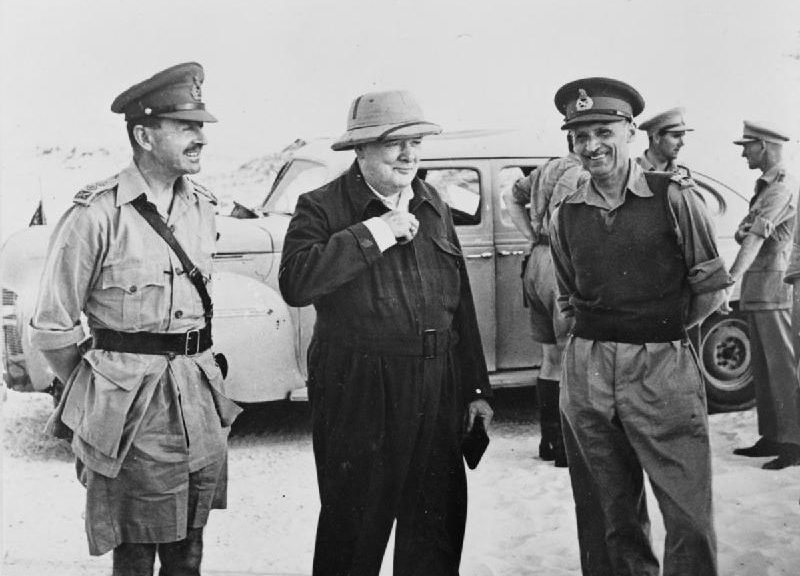
On Good News from Generals: Churchill’s Experience and Methods
Say what?
A New York Times correspondent writes:
I’ve been reading The Best and the Brightest by David Halberstam, about how we got into Vietnam. When you’re deciding whether to intervene militarily, he says, you can count on the generals to tell you everything that can go awry and stress the negative part of the picture. But once they’re invested, once it’s their job to create a good outcome through military means, it’s going to be all happy talk. They’re not going to report that they’re failing. They’re going to give you the sunnier side of what’s happening, in this case, in Afghanistan. And that’s what happened.
Duh!
Is this an earth-shaking revelation? We’ve known how generals tell pols what they want to hear at least since General MacArthur told President Truman the Chinese would never cross the Yalu River into Korea. In 1952 Dwight Eisenhower campaigned for president promising to go to Korea himself. Before being inaugurated, he kept that promise.
A decade or so later, we had General Westmoreland in Viet Nam, always promising that success was just around the corner. The journalist Peter Arnett claimed that another officer said, “We destroyed the village in order to save it.” (Alas this proved to be what Churchill might call a “terminological inexactitude.” But it seemed to fit the mood of the time.)
Let us go back farther to the First World War. Prime Minister David Lloyd George never asked a lot of questions of his generals, and for years let them send the lads “over the top,” decimating a generation.
The Second World War was conducted differently. In 1942, Prime Minister Churchill went to North Africa himself when he thought he was being fed rubbish by generals. (In that case it was out of impatience to beat Rommel’s Afrika Korps, not optimistic scenarios by the military. Still, it was a studied contrast to the leader’s curiosity in the previous war.)
Churchill had just been challenged by a vote of confidence. He won handily, but realized the country was weary and needed a victory. In August 1942 he flew to Cairo, toured the Western Desert, and sacked the gallant Gen. Claude Auchinleck. He installed Harold Alexander as Middle East commander and Bernard Montgomery to head the 8th Army. Alex and Monty took twice as long to tackle Rommel as Auchinleck had promised. Still, when they did, the result was absolute triumph. Professor Raymond Callahan is writing about all this currently for the Hillsdale College Churchill Project.
Demanding the facts
Eliot A. Cohen offers another example of Churchill’s ability to ferret out truth from generals. In March 1941 he queried then-commander of Home Forces, General Sir Alan Brooke, on a January exercise called “Victor”:
1. In the invasion exercise “Victor,” two armoured, one motorised and two infantry divisions were assumed to be landed by the enemy on the Norfolk coast in the teeth of heavy opposition. They fought their way ashore and were all assumed to be in action at the end of 48 hours.
2. I presume the details of this remarkable feat have been worked out by the Staff concerned. Let me see them. For instance, how many ships and transports carried these five Divisions? How many Armoured vehicles did they comprise? How many motor lor ries, how many guns, how much ammunition, how many men, how many tons of stores, how far did they advance in the first 48 hours, how many men and vehicles were assumed to have landed in the first 12 hours, what percentage of loss were they debited with? What happened to the transports and store-ships while the first 48 hours of fighting were going on? Had they completed emptying their cargoes, or were they still lying in shore off the beaches? What naval escort did they have? Was the landing at this point protected by superior enemy daylight Fighter formations? How many Fighter airplanes did the enemy have to employ, if so, to cover the landing places?
Brooke gamely replied and they sparred back and forth for weeks. “What is the significance of this?” Dr. Cohen asks. First, “Brooke stood up to Churchill and not only did not suffer by it, but ultimately gained promotion to the post of Chief of the Imperial General Staff. But more important is Churchill’s observation that ‘It is of course quite reasonable for assumptions of this character to be made as a foundation for a military exercise. It would be indeed a darkening counsel to make them the foundation of serious military thought.'”
Close scrutiny today…
…is much easier with instant communication. Brooke and Churchill could have got through their debate on “Victor” with a few emails. Churchill could have visited his North Africa commanders on Zoom or Facetime. Presidents or Prime Ministers needn’t hie to the scene of battle when they think their generals are lying to them. (In Afghanistan by the end of August there was nothing to hie to.) But the principle remains. Generals say what they hope civilian bosses wish to hear. So let’s stop stating the obvious. Of course generals put the best spin on what they’re doing. The problem is what some of them are asked to do.
The military do two things well. They break things and kill people. It’s when politicians order them to build democracy or back corrupt local grifters that they’re not so good. And that’s when they frequently tend to exaggerate their prospects.
Further reading
“Generals Wavell and Auchinleck and the Lost Art of Going Quietly,” 2023.
Eliot A. Çohen, “Churchill and His Military Commanders” (2016), part 1 of 3 parts.






